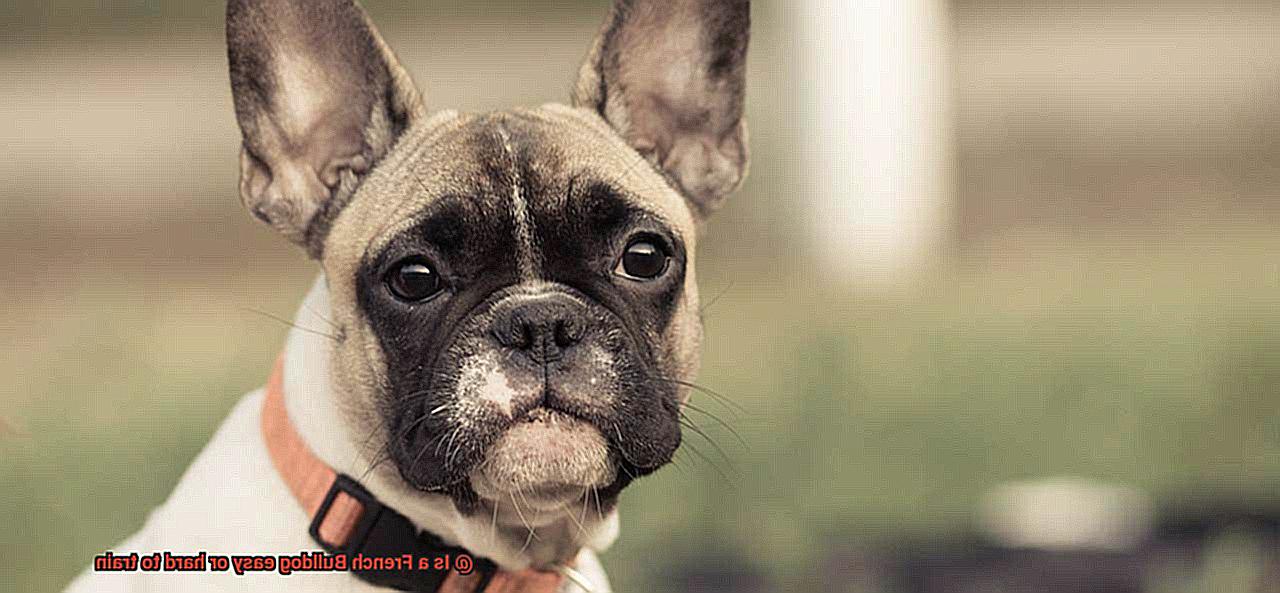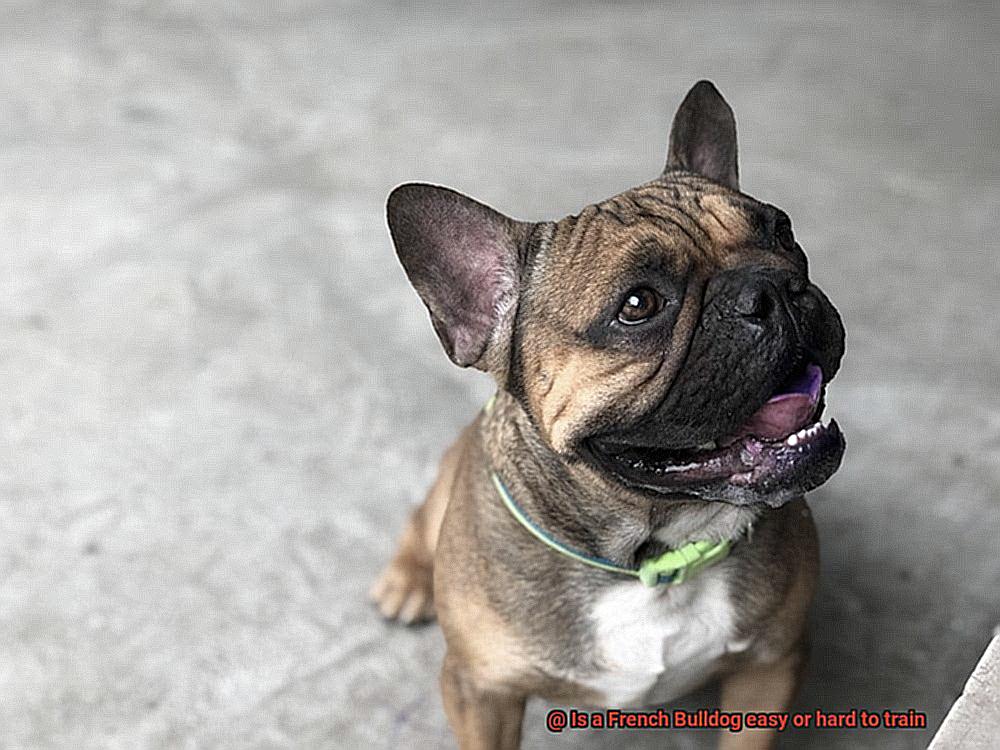Is a French Bulldog easy or hard to train?
Are you captivated by the irresistible charm of French Bulldogs? With their unique bat-like ears, expressive eyes, and adorable squished faces, these lovable canines have stolen the hearts of dog enthusiasts worldwide. But when it comes to training these furry companions, one question looms large: is it a breeze or an uphill battle?
Join us on a quest to uncover the truth behind training a French Bulldog. Get ready for eye-opening insights, surprising revelations, and expert advice about these charming yet occasionally stubborn pups.
Beneath their whimsical exterior lies an inherent intelligence and a mischievous streak that can make training a French Bulldog both challenging and rewarding. Some may argue that they are headstrong and resistant to instruction, while others claim they possess an innate desire to please their owners, making them a joy to train.
In this blog series, we’ll explore the highs and lows of French Bulldog training, sharing success stories along with tips and techniques to guide you through this incredible journey. Whether you’re a seasoned dog trainer or new to the world of canine companionship, our aim is to unravel the enigma of French Bulldog training and help you forge an unbreakable bond with your furry friend.
So grab your favorite beverage, settle in for an adventure, and prepare to dive into the captivating world of French Bulldog training as we unlock the secrets behind this delightful breed.
The Intelligence Level of French Bulldogs
Contents
- 1 The Intelligence Level of French Bulldogs
- 2 The Independent Streak of French Bulldogs
- 3 Energy Levels and Mental Stimulation for French Bulldogs
- 4 Socialization and Training a French Bulldog
- 5 Positive Reinforcement Techniques for Training a French Bulldog
- 6 Patience and Consistency When Training a French Bulldog
- 7 Understanding the Temperament of a French Bulldog
- 8 Avoiding Harsh Methods When Training a French Bulldog
- 9 Conclusion
French Bulldogs are undeniably one of the most adorable dog breeds out there. With their wrinkled snouts, bat-like ears, and affectionate nature, they have captured the hearts of dog lovers around the world. But what about their intelligence level? Can these cute little pooches be trained to become well-behaved companions? Let’s dive into the fascinating world of French Bulldog intelligence and discover how to unlock their potential.
Cracking the Intelligence Code:
French Bulldogs possess a moderate level of intelligence. While they may not be quick learners like some other breeds, they are far from unintelligent. In fact, their social intelligence shines brightly. Their friendly and sociable nature allows them to quickly understand and respond to human emotions, making them perfect therapy dogs.
Training Challenges:
Training a French Bulldog can sometimes be a test of patience. Their stubborn streak is well-known among owners and trainers alike. However, this doesn’t mean they can’t be trained; it simply means that training may require more time and effort compared to other breeds. To overcome this challenge, establishing a clear hierarchy and consistent rules from an early age is crucial.
Tips for Success:

- Keep it Short and Sweet: French Bulldogs have a shorter attention span compared to some other breeds. Make training sessions brief (around 10-15 minutes) and engaging to keep their interest piqued.
- Positive Reinforcement: French Bulldogs respond best to positive reinforcement techniques. Shower them with praise, treats, and rewards when they exhibit good behavior. This will motivate them to repeat the desired actions.
- Mental Stimulation Matters: While French Bulldogs may not require as much physical exercise as some other breeds, mental stimulation is essential for their well-being. Incorporate interactive toys, puzzles, and games into their daily routine to keep their minds sharp and focused during training sessions.
- Socialization is Key: French Bulldogs can be prone to separation anxiety and fearfulness if not properly socialized. Introduce them to different environments, people, and animals from a young age to help them become well-adjusted and confident.
Remember, Individual Differences Matter:
Just like humans, each French Bulldog has unique personality traits and learning abilities. Some may be more receptive to training and show quicker progress, while others may require more time and patience. Tailor your training approach to suit your Frenchie’s individual needs and always keep a positive attitude.
The Independent Streak of French Bulldogs
French Bulldogs are known for their independent nature, which can sometimes make training a bit challenging. They have a strong-willed personality and may not always be eager to please their owners during training sessions. This independent streak can make them prone to distraction, as they may choose to follow their own instincts rather than obeying commands.
Establishing Yourself as the Pack Leader
To effectively train a French Bulldog, it is important to establish yourself as the pack leader. This means consistently enforcing rules and boundaries with your furry friend. By doing so, you are showing them that you are in charge and that they need to listen to you.
Consistency is Key
Consistency is key when training a French Bulldog. They may become confused or resistant if the rules are not consistently enforced. It is important to use the same commands and techniques consistently, so they understand what is expected of them.
Positive Reinforcement Techniques
Positive reinforcement techniques, such as treats and praise, can be effective in motivating and rewarding French Bulldogs during training sessions. They respond well to positive reinforcement and will be more likely to repeat behaviors that are rewarded.
Starting Early for Success

It is recommended to start training early with French Bulldogs to establish good behaviors and prevent any potential behavior problems in the future. With their intelligent nature, they can learn quickly when given proper guidance and training.
Personal Insights
Having trained several French Bulldogs myself, I have found that patience, consistency, and positive reinforcement are key elements in successfully training these independent pups. It is crucial to be firm yet gentle with them, as they can be sensitive to harsh corrections.
Energy Levels and Mental Stimulation for French Bulldogs
French Bulldogs are known for their moderate energy levels, which can greatly impact their trainability. Understanding their energy levels and providing them with adequate mental stimulation is crucial in effectively training these intelligent and sometimes stubborn dogs.
Moderate Energy Levels
Compared to high-energy breeds like Border Collies, French Bulldogs have a more moderate energy level. This means that while they do require exercise and mental stimulation, they won’t need intense physical activities to tire them out. However, it’s important to note that French Bulldogs are brachycephalic, meaning they have short noses, which can make them more prone to heat exhaustion and respiratory issues. It’s essential to tailor their exercise routine to their individual needs and abilities.
Mental Stimulation is Key
French Bulldogs are intelligent dogs, and without proper mental stimulation, they can quickly become bored and exhibit destructive behaviors. Incorporating activities that challenge their minds can help keep them engaged and focused during training sessions. Puzzle toys and interactive games are excellent ways to mentally stimulate French Bulldogs, as these toys require problem-solving skills and provide a reward for their efforts.
Short Training Sessions
French Bulldogs have relatively short attention spans, so breaking up training into shorter sessions throughout the day is more effective than one long session. This helps maintain their focus and prevents boredom or frustration. Consistency is key in training French Bulldogs, so setting aside regular time each day for training is essential.
Positive Reinforcement Training
French Bulldogs respond best to positive reinforcement training methods. Praising, treating, and rewarding them when they exhibit desired behaviors will motivate them to continue performing those actions. Harsh or punitive training techniques can be counterproductive and may cause anxiety or fear in these sensitive dogs.
Consistency and Patience
Training French Bulldogs may take longer than with some other breeds due to their independent nature. However, with consistent practice, patience, and positive reinforcement, they can become well-trained companions. It’s important to remember that every dog is unique, and some may learn more quickly than others. Celebrate small victories and be patient with your French Bulldog as they learn and grow.
Socialization and Training a French Bulldog
In this blog post, we’ll explore the importance of socializing your French Bulldog from an early age and provide some tips for effective training. So grab a cup of coffee, sit back, and let’s dive in.
Socializing Your Frenchie from Day One
Start Early:
- Begin socialization as early as possible to help your Frenchie develop good behavior and adaptability.
- Puppy classes or playdates with other well-behaved dogs can contribute to their social development.
Expose to Different Environments:
- Take your Frenchie to parks, streets, and public places to boost their confidence and reduce anxiety in new situations.
- Introduce them to various people, including children and adults, to ensure they become comfortable around different individuals.
Training Tips for a Well-Behaved Bulldog

Positive Reinforcement is Key:
- Use reward-based training methods, such as praise and treats, to motivate your Frenchie.
- Positive reinforcement helps them understand what behaviors are desirable.
Short and Engaging Sessions:
- Keep training sessions short to accommodate your Frenchie’s shorter attention span.
- Make training engaging by using interactive toys or incorporating play into the sessions.
Basic Obedience Commands and Housebreaking
Teaching Basic Commands:
- Teach commands like sit, stay, come, and leave it from an early age.
- Consistency is crucial to reinforce these commands effectively.

Housebreaking Tips:
- Establish a regular feeding schedule and take your Frenchie outside after meals to promote successful elimination.
- Reward them for desired behavior and be consistent in your routine.

Addressing Behavioral Issues
Tackling Jumping, Barking, and Separation Anxiety:
- Consistent training using positive reinforcement techniques can help correct these behaviors.
- Seek professional help if needed to address more severe behavioral issues.
Positive Reinforcement Techniques for Training a French Bulldog
Training a French Bulldog can be a fun and rewarding experience for both the dog and their owner. Positive reinforcement techniques are highly effective in training French Bulldogs, as they focus on rewarding desired behaviors and encouraging the dog to repeat them. In this section, we will explore the importance of using positive reinforcement techniques and provide tips for successful training.
Benefits of Positive Reinforcement:
- Builds a strong bond: Using positive reinforcement creates a positive association between the owner and the dog, strengthening their bond and trust.
- Encourages good behavior: By rewarding desired behaviors, such as sitting or walking nicely on a leash, you are reinforcing these behaviors and encouraging your French Bulldog to continue exhibiting them.
- Reduces anxiety and fear: Positive reinforcement creates a positive training environment, reducing stress and anxiety in your French Bulldog.
- Promotes mental stimulation: Training sessions that involve positive reinforcement provide mental stimulation for your French Bulldog, keeping them engaged and active.
- Increases confidence: When your French Bulldog successfully performs a desired behavior and is rewarded, it boosts their confidence and encourages them to try new things.

Tips for Effective Positive Reinforcement Training:
- Find the right rewards: Experiment with different types of rewards, such as treats, praise, or playtime, to determine what motivates your French Bulldog the most.
- Use clear cues: Use consistent verbal cues and hand signals to communicate with your French Bulldog. This helps them understand what behavior is expected of them.
- Timing is key: Immediately reward your French Bulldog when they perform the desired behavior. This helps them make the connection between the behavior and the reward.
- Be consistent: Consistently reward desired behaviors and ignore or redirect unwanted behaviors. This helps your French Bulldog understand what behaviors are rewarded and encourages them to repeat them.
- Keep training sessions short and fun: French Bulldogs have a shorter attention span, so keep training sessions short, around 10-15 minutes, and make them enjoyable for your dog.
- Be patient and persistent: French Bulldogs can be stubborn at times, so patience and persistence are key. Stick to the positive reinforcement techniques and be consistent in your training efforts.
By using positive reinforcement techniques, you can effectively train your French Bulldog and achieve desired behaviors. Remember to be patient, consistent, and use rewards that motivate your dog. With time and effort, you will have a well-behaved and obedient French Bulldog companion.
Patience and Consistency When Training a French Bulldog
In this post, we will explore why patience and consistency are essential when it comes to successfully training these stubborn yet lovable companions. So, grab a cup of coffee, sit back, and let’s dive right in.
Understanding the Stubborn Side:
French Bulldogs are notorious for their independent and strong-willed nature. This means that patience is key when it comes to training them. Remember, Rome wasn’t built in a day, and you won’t transform your Frenchie into a perfect pup overnight.
Creating the Ideal Training Environment:
To ensure successful training sessions, it’s crucial to minimize distractions. Find a quiet spot in your home where you and your Frenchie can focus solely on training. Consider using a designated training area or even investing in a puppy playpen for added control.
The Power of Positive Reinforcement:
French Bulldogs respond best to positive reinforcement techniques. Praise, treats, and rewards will motivate your Frenchie to learn and repeat desired behaviors. Keep those tasty treats handy during training sessions to reinforce good behavior consistently.
Consistency is Key:
Consistency is the glue that holds successful training together. Establish a routine and stick to it. Set specific training times and ensure that everyone in your household follows the same rules and commands. This will prevent confusion for your Frenchie and accelerate their learning process.
Short and Sweet Sessions:
French Bulldogs have short attention spans, so keep training sessions short and focused. Aim for 10-15 minute sessions, broken down into smaller tasks that gradually progress as your Frenchie improves. Remember, quality over quantity.
Tailor Training to Your Frenchie’s Personality:
Every French Bulldog is unique, and some may require more time and patience than others. Tailor your training approach to suit your Frenchie’s personality and learning style. Be flexible in your methods and adapt as needed.
Fun and Games:
Training should be a positive experience for both you and your Frenchie. Incorporate playtime and interactive activities into training sessions to keep your pup engaged and motivated. Remember, a happy Frenchie is a trainable Frenchie.
Understanding the Temperament of a French Bulldog
French Bulldogs are beloved companions known for their friendly and sociable nature. However, their unique temperament can influence their trainability. In this article, we will delve into the various aspects of their temperament and how it impacts their ability to learn and be trained.
Friendly and Sociable Nature:
French Bulldogs are known for their friendly and sociable temperament. They easily form bonds with people of all ages, including children. This inherent friendliness makes them more receptive to training as they are eager to please their owners.
Stubbornness and Independence:
Despite their amiable nature, French Bulldogs can also be stubborn at times. They possess a strong will and may exhibit independent behavior, which can pose challenges during training. Establishing yourself as the pack leader and using positive reinforcement techniques are crucial in motivating them to follow commands.
Intelligence:
French Bulldogs are intelligent dogs, which works in their favor when it comes to training. They are quick learners and can pick up commands relatively easily. However, their intelligence can also lead to boredom if training sessions become repetitive. Keeping sessions short, varied, and engaging will help maintain their interest and focus.
Sensitivity:
French Bulldogs have a sensitive side to their temperament. They are emotionally sensitive dogs who can become stressed or anxious if they sense tension or negativity in their environment. It is essential to consider this sensitivity during training, avoiding harsh methods or punishment that could hinder their progress.
Patience and Consistency:
Patience and consistency are key when training a French Bulldog. They may take longer to grasp certain commands or behaviors compared to other breeds. However, with patience and consistent reinforcement, they can become well-trained companions.
Individual Differences:
It is important to note that individual temperaments can vary among French Bulldogs. Some may be naturally more inclined towards being easy to train, while others may require more effort and time. Understanding your specific dog’s temperament and tailoring the training approach accordingly is crucial for successful outcomes.
Avoiding Harsh Methods When Training a French Bulldog

In this blog post, we will explore why positive reinforcement is the key to success, how it benefits your pup, and provide practical tips for effective training.
The Gentle Nature of French Bulldogs:
French Bulldogs are known for their sensitive and gentle nature. They thrive on positive interactions and are highly responsive to kind, reward-based training methods. Harsh methods, such as physical punishment or yelling, can have detrimental effects on their training progress and overall well-being.
The Power of Positive Reinforcement:
Positive reinforcement training focuses on rewarding desired behaviors while ignoring or redirecting unwanted ones. It involves using treats, praise, and playtime as motivators to encourage your Frenchie to repeat good behaviors. This method strengthens the bond between you and your furry friend and fosters a positive learning environment.
Creating a Positive and Supportive Environment:
To effectively train your French Bulldog, it is vital to create a positive and supportive environment. This includes using a calm and patient tone of voice, providing clear and consistent commands, and using rewards that motivate your pup. By doing so, you enhance their enthusiasm for learning and build a strong foundation for obedience.
Realistic Expectations and Patience:
French Bulldogs may take longer to learn certain commands compared to other breeds due to their independent streak. However, with consistent practice and positive reinforcement, they can master the desired behaviors. Remember to be patient with your Frenchie and celebrate every small victory along the way.
The Dangers of Harsh Methods:
Harsh training methods can lead to fear, anxiety, and even aggression in French Bulldogs. They may become wary of training sessions and view them as negative experiences, hindering their progress. Instead of focusing on punishment, redirect unwanted behaviors and reward your Frenchie for making the right choices.
Consistency is Key:
Consistency is crucial when using positive reinforcement methods. Ensure everyone in your household follows the same training techniques and commands to avoid confusion for your Frenchie. This consistency provides clear feedback and rewards, helping them understand what you expect from them.
Conclusion:
In conclusion, training your French Bulldog should be a joyful experience that strengthens your bond and enhances their well-being. By avoiding harsh methods and embracing positive reinforcement, you can unlock their full potential and create a well-trained companion tailored to their unique temperament. Remember, patience, consistency, and kindness are the keys to success when training your beloved Frenchie.
Em5WE9QFfa0″ >
Conclusion
In conclusion, training a French Bulldog can be both easy and challenging.
While they are intelligent and eager to please, their stubborn nature can sometimes make the training process more difficult. However, with patience, consistency, and positive reinforcement techniques, you can successfully teach your French Bulldog basic commands and behaviors.
Remember to keep training sessions short and engaging to hold their attention. Additionally, socialization from an early age is crucial for a well-rounded and obedient French Bulldog.
With the right approach and dedication, you can train your furry companion to be a well-behaved member of your family.




